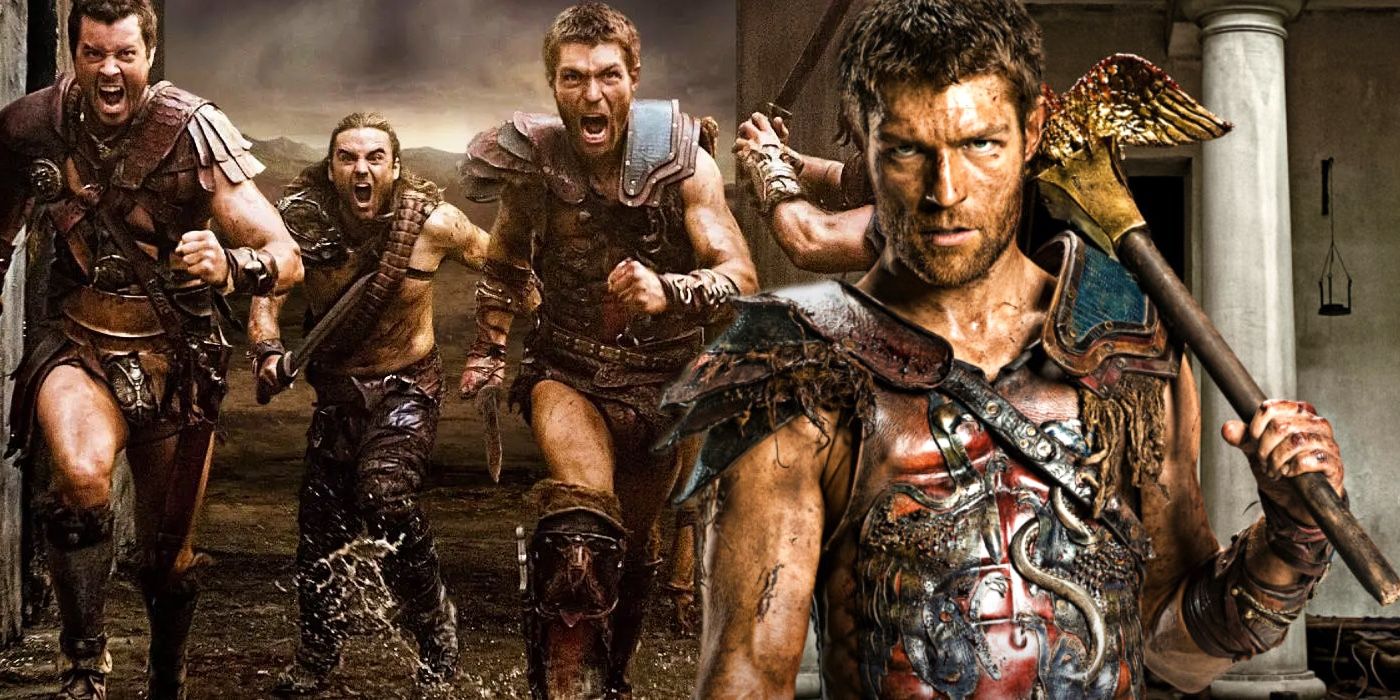Spartacus: 6 Things That Are Historically Accurate (& 6 Things That Are Completely Fabricated)
Summary The TV series Spartacus is based on the real-life legend, but much of the story is fictionalized, although the first season stays fairly true to historical facts.
The portrayal of Spartacus' origins as a Thracian slave who becomes a renowned gladiator is historically accurate, but his ties with the Roman Empire are uncertain.
The show accurately depicts the gladiator lifestyle and incorporates real-life historical figures who played roles in Spartacus' rebellion, although some details may be dramatized for entertainment purposes.
Much like the classic movie starring Kirk Douglas, the Starz series Spartacus is a true story though it makes notable differences to what actually happened. The series focused on Spartacus during three key moments in his life, from his time as a slave all the way to his death. The legend of Spartacus is so popular that it has been adapted into several forms of media over the years, including the 1960 film by Stanley Kubrick. However, while the legend of Spartacus is based on true events, much of the legend is still fictional.
Surprisingly enough, however, much of the TV series holds true to the historical time frame. Almost ten years since Spartacus concluded its three-season run with Spartacus: War of the Damned, the series continues to be one of the best sword-and-sandal stories set during the Ancient Roman period. For many viewers, the question of whether Spartacus was a real person or whether the story is based on real events continues to spark interest. The series is surprisingly truthful with many of its finer details surrounding the life of Spartacus.
Watch on Starz
Related 14 Movies To Watch If You Love The Roman Empire While some movies about the Roman Empire are prone to historical inaccuracies and boring plots, others have impressed film fans and critics alike.
Things in Spartacus That Were Historically Accurate
Spartacus’ Origin
Season one of Spartacus focuses heavily on how the legend began. Furthermore, based on what historians know, the first season is fairly accurate in recreating this epic story. It is known that Spartacus was of Thracian origin and was eventually captured and enslaved by the Roman army. Eventually, Spartacus would find himself a gladiator and earn quite a name for himself as one of the best fighters in the arena, earning popularity with the crowds.
In regards to his ties with the Roman Empire, historians aren’t quite sure of what exactly happened. The show depicts the two groups as collaborators at first, with the Romans eventually turning on the Thracians and enslaving them. While the enslavement part is certainly true, the idea that two sides originally worked together is only based on theories and nothing concrete.
House Batiatus
Close
Audiences see Spartacus as he trains under the house of Cornelius Batiatus (John Hannah), a trader and trainer of gladiators. He is shown to be the one who names his new star gladiator Spartacus, after a ferocious Thracian king of that name. He is shown to be a man consumed with greed and the desire for success, making him the main antagonist of Spartacus: Blood and Sand.
Like in the show, the house resided in Capua and functioned as a school for gladiators, new and experienced alike. Quintus Batiatus was a real person in Ancient Rome, though his name is often debated. Furthermore, it is here that Spartacus began his rebellion with the escape of about 70 slaves. While very little is known about Batiatus himself or the actual workings of the house, the show does a great job of leading the characters to the same real-life result.
Related 11 Things You Didn't Know About Spartacus (on Starz) Let’s take a look back at Spartacus, a hugely successful series for Starz, and discuss some facts about the series you may not have known.
The Gladiator Lifestyle
Close
Part of the show’s grand appeal was the dramatic lifestyle featured in the series, especially between the wealthy and the enslaved. This dynamic allowed for some very interesting relationships to form which only added to the drama of the series. Though some of the relationships themselves would have been dramatized for entertainment purposes, a lot of lifestyle practices hold true to history as also seen in the historical adventure Gladiator.
For example, gladiators who performed well were treated as free men and awarded great prizes, and sometimes even allowed relationships with women. It was even known that many gladiators embraced the dangerous life because of the benefits. Furthermore, the politics of being a slave also holds true. Though it is unclear how much of this related to the real Spartacus and his experiences as a gladiator, they certainly took place as part of the gladiator culture.
His Supporting Crew
Close
While Spartacus is an iconic character and the titular one in this series, Spartacus is also a large ensemble series. The show featured a terrific supporting cast of characters, many of whom audiences grew attached to. Manu Bennet as Crixus played an especially big role, much like the real Crixus did in the real Spartacus story. Other characters, such as Gannicus and Castus, were also real-life individuals who participated in Spartacus’ rebellion.
Even though their actual roles differ between the show and the actual events, it is still nice to know that the role these people played in history is still being acknowledged. For the most part, the show does a fantastic job of incorporating characters from Spartacus’ actual background into the TV show while using them to create worthwhile and interesting characters within the narrative.
Related 5 Reasons Spartacus Is A Better Show Than Rome (& 5 Reasons Rome Is) Spartacus and Rome may be similar shows, but each has some ways in which it outdoes the other. Here are all those ways.
Third Servile War
Regardless of his true death, the story of Spartacus ends after the Third Servile War. During the war, Marcus Crassus made his final stance against Spartacus, and with vastly superior numbers. The show plays out a lot of similar battle strategies used by the Romans and depicts the results rather accurately. Only a few key changes were made to wrap up some of the show’s story arcs.
Likewise, most major battles that take place in the show actually took place in real life. The move against Spartacus on Mount Vesuvius unfolded in a very similar manner to real life. The show's attention to detail really helped build the narrative in a believable fashion while also allowing the series to display epic battle sequences that feel authentic due to the real-world aspects the show is drawing from.
Escape From Crassus
Another plotline in Spartacus ripped straight from history was his grand plan to escape Crassus. During War of the Damned, the war between Spartacus and Crassus' forces reach a boiling point. Unfortunately, it seems as though Spartacus is trapped as Crassus has his forces surrounding Spartacus' army on the peninsula of Rhegium. However, when a snowstorm hits, Spartacus uses the sudden inclement weather to his advantage.
He digs a ditch that functions to trap Crassus' army. After they charge forward, the men fall to their deaths, then allowing Spartacus and his army to safely cross. His escape from Crassus follows ancient Roman philosopher and author Plutarch of Chaeronea's account in Life of Crassus. Starz's Spartacus is surprisingly historically accurate, especially in its first season. However, there are some historical liberties that the series takes.
Related 5 Reasons Spartacus Is A Better Show Than Rome (& 5 Reasons Rome Is) Spartacus and Rome may be similar shows, but each has some ways in which it outdoes the other. Here are all those ways.
Things In Spartacus That Were Historically Inaccurate
Spartacus’ Relationship With Glaber
As one of the series' main villains, Spartacus comes to interact with Claudius Glaber multiple times. For the narrative’s sake, Glaber was portrayed as the person who betrayed Spartacus and sold him into slavery, similar to what happened to Maximus in Gladiator. Throughout the series, the two seemed locked into battle against each other as Spartacus sought revenge against Glaber.
However, very little is known about Glaber in real life aside from his humiliating defeat at the hands of Spartacus. While Glaber himself was very real, there is nothing to suggest that the two men knew each other by anything other than reputation. The real-life battle between the two was likely much more politically driven than personal. Despite this, the show still finds a very clever way to incorporate Glaber into a larger role in the show despite his small mark on history.
Caesar’s Involvement
The third season of the series sees actor Todd Lasance in the role of Julius Caesar himself. This version of Caesar works closely with Roman General Marcus Crassus to help defeat Spartacus and his armies. The show sees Caesar as very involved in the plot to take down Spartacus, even going so far as to infiltrate his forces.
While Caesar lived during this rebellion and did personally know Crassus, he historically had no involvement in the events that transpired. He also certainly did not infiltrate Spartacus’ armies and spy on him in any manner. However, it is understandable the show was tempted to bend the facts in order to create a more interesting role for such a legendary historical character. While it may have made for good drama, it is also one of the show’s biggest historical inaccuracies.
Related Starz' Spartacus: 10 Times It Broke Our Hearts While this show had its share of satisfying thrills and fun spectacles, there were more than a few emotional, saddening, and gutwrenching moments.
The Death Of Spartacus
It is always bold of a show to kill off its main character, but fans of Spartacus were likely expecting this outcome when the series started. Spartacus' ending comes in dramatic fashion as, amid a massive battle, he finds himself facing off with Crassus himself. Driven by the memory of his fallen friends and loved ones, Spartacus overcomes Crassus only to be taken down by Roman soldiers before he can deliver the death blow.
The details surrounding the death of the real Spartacus remain a mystery to this day. It is speculated that he died at the end of the Third Servile War when Marcus Crassus’ forces finally overwhelmed Spartacus’ soldiers. However, there is no confirmation of this, as Spartacus’ body was never discovered. Though the series finds a clever way to spin the ending of the show with the actual theories around his death, audiences still get to see Spartacus’ final moments.
The Wife Of Spartacus
Aside from Julius Caesar, there is another main character whose portrayal in Spartacus is inaccurate. Sura (Erin Cummings) was Spartacus' Thracian wife, who was taken from him by his enemy, Gaius Claudius Glaber. However, the memory of her stays with Spartacus forever and motivates him throughout his journey. In fact, it is the memory of her he holds onto as he dies with her speaking his true name rather than the slave name he's become known by. After her death, Spartacus forms a relationship with Mira (Katrina Law), an enslaved girl at the House of Batiatus.
In actuality, his wife actually spent time with him at the house and even escaped with him and the other slaves. Her actual name is unknown, but there’s no denying that she played a major role in his motivations.
“I Am Spartacus”
Most people are familiar with the famous line, “I am Spartacus.” This quote was made famous thanks to the 1960 Stanley Kubrick movie. In this scene, as Spartacus and his army are captured, Spartacus stands up declaring “I am Spartacus” as a means of hoping to spare the rest of his allies. Due to the unquestionable devotion of his followers, though, everyone else eventually stands up and also declares, “I am Spartacus.” The show, however, spins this quote very differently.
During some of the latter and final raids made by Spartacus and his crew, various members are seen declaring “I am Spartacus” throughout. Doing so serves as a great callback to the original film while also showing how Spartacus evolved as an ideal. However, both versions of the famous quote are entirely fictitious. There is no evidence of any quote or of any great defense of his people by Spartacus in any manner. Unfortunately, this famous saying is purely derived from the example set by Spartacus and isn’t actually a part of his history.
Tiberius Crassus Wasn't Real
Crassus' impulsive and overconfident son Tiberius, who was tasked with defeating Spartacus and his army, is an even more villainous force than his father Marcus. He shows nothing but general contempt for the world around him and even expects people that he crosses to do him favors. His treatment of Kore is also abominable, as she's shown to care for him in some regard, and in return, he subjects her to threats and rape.
Reportedly, Marcus Crassus did have two sons, but none of them were named Tiberius. Instead, Crassus' real-life sons were Marcus and Publius. Not much is known about either of Crassus' children, though Publius' achievements overshadowed Marcus', bringing the birth order into question despite tradition dictating that firstborns are named after their fathers. Both Publius and the elder Marcus died in the Battle of Carrhae, and the younger Marcus served under Caesar in the Gallic Wars.











COMMENTS